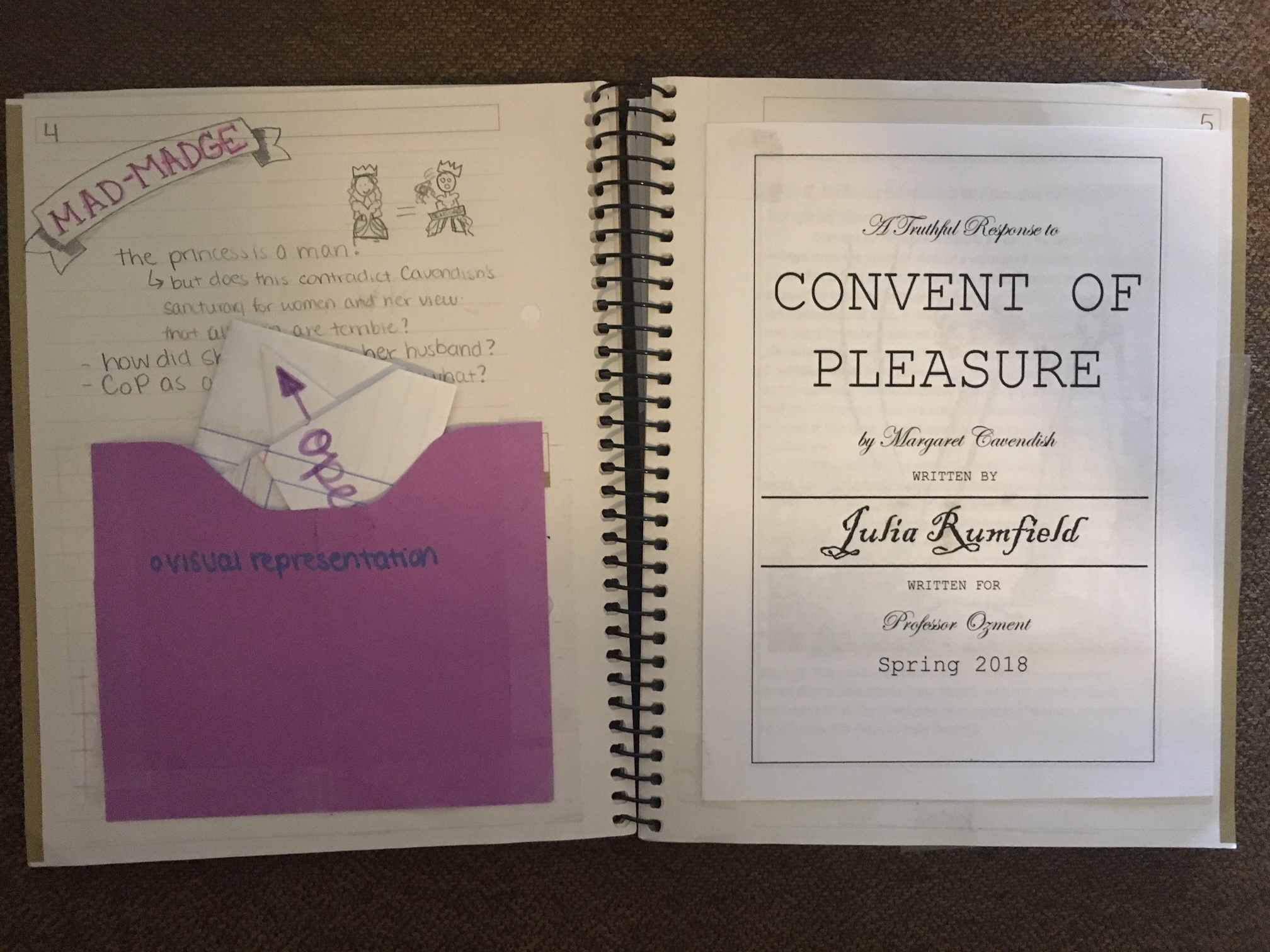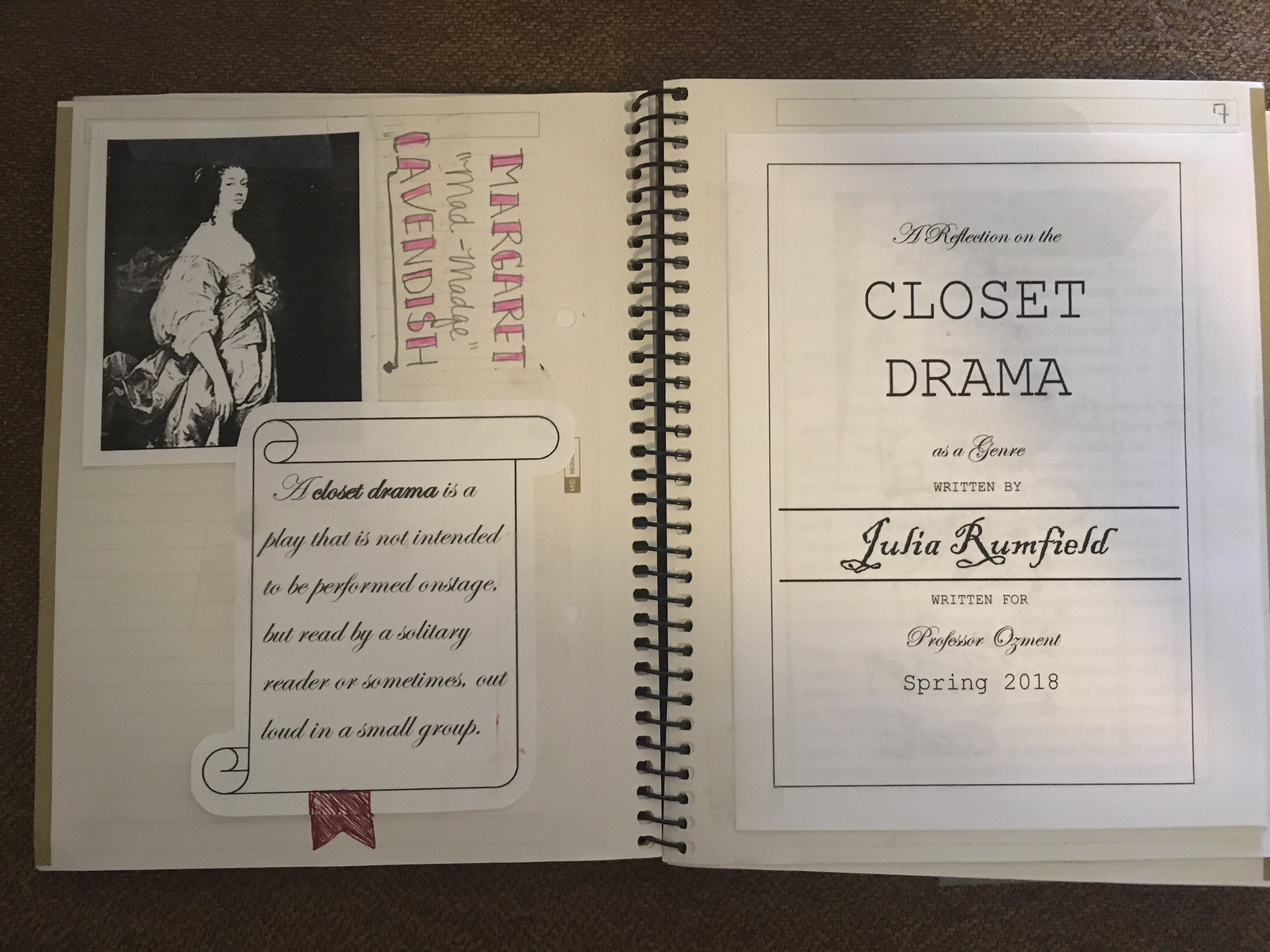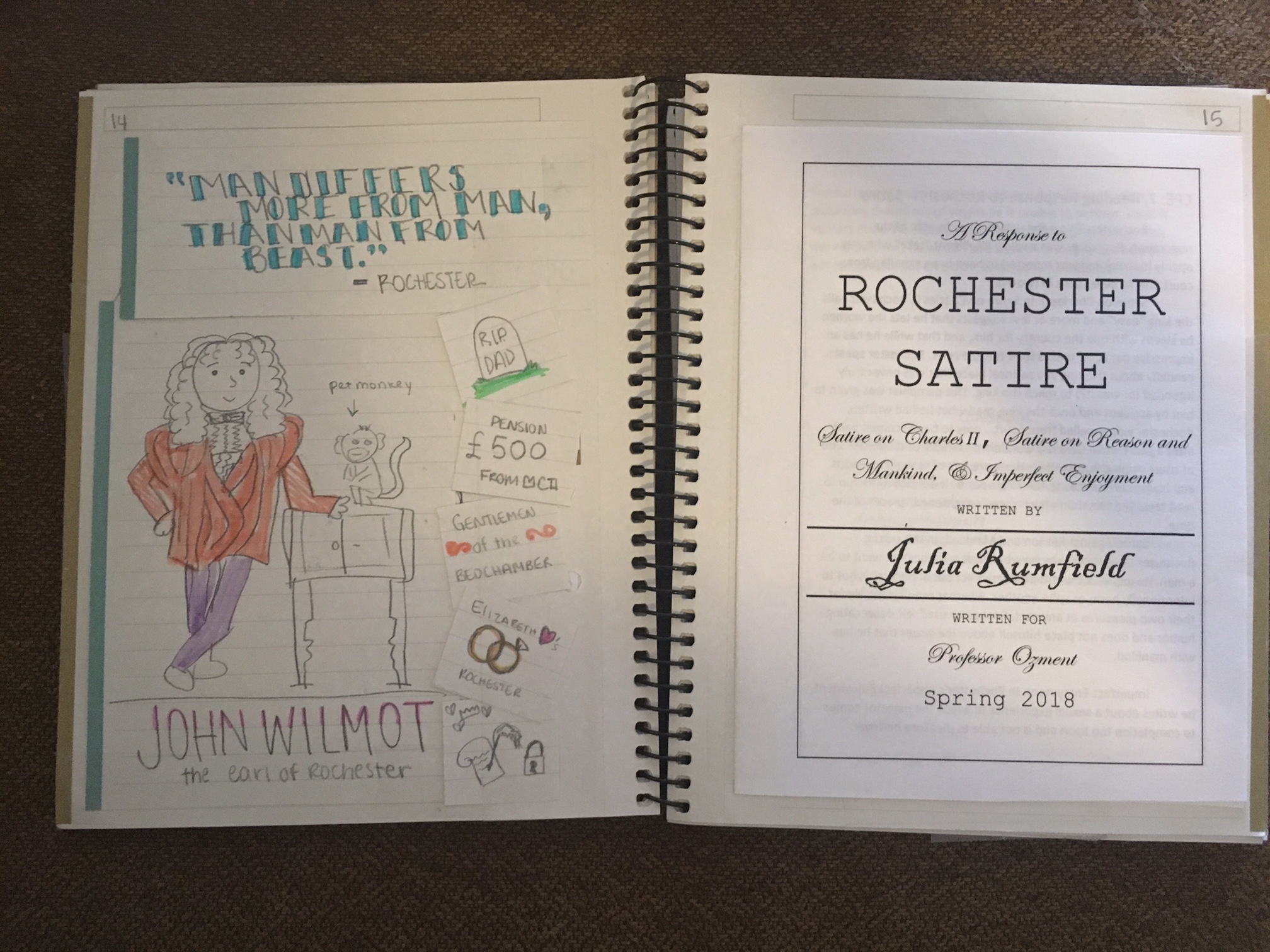Teaching Manuscript: Commonplace Books
Posted by Kate Ozment
I find great value in participation grades—if someone shows up to class with reading done and good things to say, I want to reward them for that work. So much of the literature I teach can put students off at first. John Dryden's Mac Flecknoe and Alexander Pope's Essay on Man are wonderful discussion pieces, but usually upon first reading students find them inaccessible and intimidating (and I don't blame them). If they get through it anyway, I want to acknowledge that, and to incentivize them to keep trying. But, participation grades have a layer of subjectivity to them that makes me uncomfortable. I know when they're on their computers or absent, and I log things. But how to empirically approach a participation grade is not something I have mastered. So, this semester, my eighteenth-century literature class replaced it with journaling. More specifically, we replaced it with a commonplace assignment.
Commonplacing as a classroom practice appeals to me for several reasons. First, it gets students writing, and writing daily—an exercise that I think is so valuable that I wish I had as dedicated as much space to my writing as they did this semester. Secondly, it links us to a practice of authorship that we often do not lend as much credence as printed material or "public" material. As Margaret J.M. Ezell has written in several capacities, manuscript writing persisted past the birth of the printing press, and there is a vibrant culture in the seventeenth and eighteenth centuries of domestic manuscript writing and public manuscript publication. Thankfully, in recent years these practices have gotten much more attention—my personal favorite is the recent surge in studies on cookbooks and herbals.
In the course's content, I tied in study of manuscript writing in several ways, with the aforementioned Mac Flecknoe (which it seems Dryden did not intend to publish in print), Anne Finch, and Katherine Philips. I also did another exercise in manuscript circulation that I will post in July.
In Practice
If you Google "commonplace assignment," you'll get several examples. It's not an uncommon assignment, especially for Early Modern literature classes. This post will detail my approach to it and, now that the semester is done, how my students responded to it. I've uploaded the prompt on our Dropbox, located here, if you'd like to use this prompt for your own students. My thanks, specifically, to my colleague Nigel Lepianka for letting me see his last fall.
As with the post I did on pamphlet binding, this class is somewhat large. It is a junior-level survey class with a mixture of majors and interests, and I started with 35 students. This project requires very few materials—only a notebook. Some students chose to do more with it, as my images below show, but others only used a spiral notebook and a pen for the entire assignment.
They were required to do an entry for almost every class period, which totaled 38 entries (I am on a MWF schedule). Most were a standard reflection on the reading. Some chose to pull out quotes and write about them. Some chose to list questions they wanted to explore. Others just generally responded to what they read. I emphasized the informality of the assignment, which was echoed in assessment. If you gave it a decent shot and did what you were supposed to, you received full credit for the post. I ranked this as 15% of their course grade to acknowledge the amount of sustained effort it took, and it had the effect of boosting students' grades rather than taking away from them. Most of them stuck with it and did what they needed to. Considering the challenging assignments I gave them in other respects, I thought this would even out their grades a bit, and it did.
Some commonplace entries had special requirements, and in this respect I let the assignment slip more into a course journal than a personal account. Their first entry was goal setting and the last was reflection on their semester. For workshop days, students wrote about what they did afterward rather than what they read in advance. When we had secondary articles as reading, I asked them to analyze the articles based on a few criteria in their notebooks. While I found value in all these exercises, I do think that it took away from what the commonplace was meant to be as a replica of historical practice, and I might ask them to do these reflections and responses separately instead in the future.
Because of the large number of students (and I teach multiple classes), I assessed the commonplace twice: once during spring break and once during finals week. The second assessment was part of a final conference where we discussed their practice in general. Grading took only a few hours each time, but I took a little more time on ones that were really engaging. Here is an example of one of the more innovative designs (shared with permission):
Coterie Day
I made a point of never writing in their notebooks to maintain their ownership over their work and keep my ideas and thoughts out of it. I also kept my assessment on forms because we had an end-of-semester coterie day, and I didn't want other students reading my comments; it is probably a FERPA violation, but it definitely did not feel like it was in the right spirit regardless.
For the coterie day, the final day of the semester, students brought their commonplace books into the classroom. To set the scene, I brought in juice, coffee, and pastries (This decision may or may not have been motivated by the fact it was my last day at my university and I was feeling sentimental about a very good semester). The idea was that it mimicked a coffee house, the kind of place where information was exchanged in the eighteenth century.
Students broke up into small groups as coteries and read each other's work for 30 minutes. I noticed they compared some of the special assignments, such as what databases they looked at or what version of Jonathan Swift's "A Modest Proposal" they rewrote. They also talked about final projects and brought up some of the more contentious days of class discussion and rehashed their points.
Reflections
In evaluations at the end of the semester, students reported that the daily commonplace assignment took them no more than 10-15 minutes to complete per class period. Looking at the books, some definitely gave them more attention than others, but they were not required to do more than the bare minimum I requested. Most students got high marks for the semester. Very few reported they actively disliked them; most ranked the assignment as they were ambivalent to positive. Considering how many of them hated the quizzes, that is actually pretty good.
In informal conversations, they reported that the commonplace gave them a ready-made study guide for quizzes and also kept them from procrastinating on their reading. These learning outcomes are highly desirable, but they are not the same as a participation grade would be. So while I still believe it was a good exercise, I do need to think more about if replacing incentives for speaking in class with written work accomplishes the goal that I find value in accomplishing—rewarding showing up and talking about hard material. One way I may meld these two outcomes in the future is requiring more participation off the commonplaces, encouraging them to bring them in to talk about. Another might be allowing a digital commonplace that uses a class Twitter hashtag or other social media, which I could use to jumpstart class discussion each day. These would, however, get away from the historical practice I made central this semester.
One thing I did like was that my more introverted students were not unnecessarily punished for not speaking in class too often. While I lament the very smart comments in commonplaces that were limited to just me and them, I do think that the commonplace assessment allows shyer students to do well and show their textual engagement even if speaking out is not their strong suit. I may find ways of bringing their writing into the class discussion as a reference more often.
About the Author
Kate Ozment received her PhD in English literature from Texas A&M University. She defended her dissertation on women's professional authorship and the eighteenth-century book trades in fall 2017, and she is currently working on a book project theorizing feminist bibliography with her WBHB co-editor, Cait Coker. Contact her at: kateozment (at) gmail (dot) com.
Want more Sammelband?
-
October 2022
- Oct 16, 2022 Teaching in the Maker Studio Part Two: Safety Training and Open Making
- Oct 16, 2022 Teaching Book Forms
- Oct 16, 2022 Teaching Letterpress with the Bookbeetle Press
-
September 2022
- Sep 24, 2022 Making a Scriptorium, or, Writing with Quills Part Two
- Sep 16, 2022 Teaching Cuneiform
- Sep 4, 2022 We're Back! Teaching Technologies of Writing
-
June 2020
- Jun 1, 2020 Black Lives Matter
- May 2020
-
April 2020
- Apr 1, 2020 Teaching Materiality with Virtual Instruction
- March 2020
-
February 2020
- Feb 1, 2020 Making the Syllabus Zine
-
January 2020
- Jan 1, 2020 Teaching Print History with Popular Culture
-
December 2019
- Dec 1, 2019 Teaching with Enumerative Bibliography
-
November 2019
- Nov 1, 2019 Finding Women in the Historical Record
-
October 2019
- Oct 1, 2019 Teaching in the Maker Studio
-
September 2019
- Sep 1, 2019 Graduate School: The MLS and the PhD
-
August 2019
- Aug 1, 2019 Research Trips: Workflow with Primary Documents
-
July 2019
- Jul 1, 2019 Research Trips: A Beginner's Guide
-
June 2019
- Jun 1, 2019 Building a Letterpress Reference Library
-
May 2019
- May 1, 2019 Teaching Manuscript: Writing with Quills
-
April 2019
- Apr 1, 2019 Why It Matters: Teaching Women Bibliographers
- March 2019
-
February 2019
- Feb 1, 2019 Roundup of Materials: Teaching Book History
-
January 2019
- Jan 1, 2019 Building and Displaying a Teaching Collection
-
December 2018
- Dec 1, 2018 Critical Making and Accessibility
-
November 2018
- Nov 1, 2018 Teaching Bibliographic Format
-
October 2018
- Oct 1, 2018 Teaching Book History Alongside Literary Theory
-
September 2018
- Sep 1, 2018 Teaching with Letterpress
-
August 2018
- Aug 1, 2018 Teaching Manuscript: Circulation
-
July 2018
- Jul 1, 2018 Setting Up a Print Shop
-
May 2018
- May 1, 2018 Teaching Manuscript: Commonplace Books
-
April 2018
- Apr 1, 2018 Getting a Press
-
March 2018
- Mar 1, 2018 Teaching Ephemera: Pamphlet Binding
- February 2018






